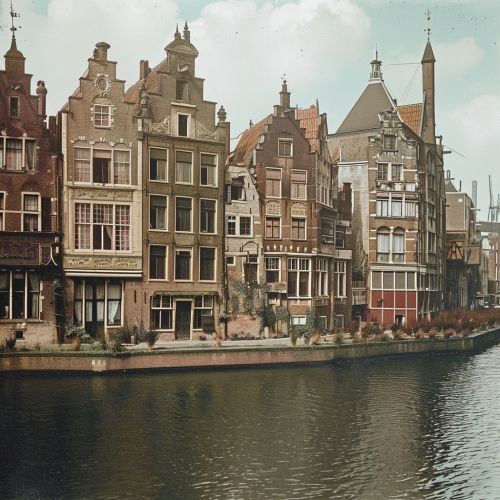Rotterdam
History
Rotterdam, located in the province of South Holland, is the second-largest city in the Netherlands. The history of Rotterdam dates back to the 13th century when a dam was constructed in the Rotte river. This gave the city its name, which literally translates to "dam in the Rotte".


The city gained city rights in 1340, allowing it to expand and become an important player in the shipping industry. In the late 16th and early 17th centuries, Rotterdam was a prosperous city, thanks to its strategic location and its status as a major port. The city was a significant hub for international trade, with goods from all over the world passing through its docks.
During the Second World War, Rotterdam was heavily bombed by the German Luftwaffe, causing extensive damage and loss of life. The city center was almost completely destroyed, a period known as the Rotterdam Blitz. After the war, the city underwent a significant reconstruction process, transforming it into a modern, thriving metropolis.
Geography and Climate
Rotterdam is located in the western part of the Netherlands, in the province of South Holland. The city is situated on the banks of the Nieuwe Maas, one of the channels in the delta formed by the Rhine and Meuse rivers. The city's location near the North Sea gives it a temperate oceanic climate, with mild summers and cool winters.
The city's geography is characterized by its flat landscape, which is typical of the Netherlands. The city is largely below sea level, with numerous canals and waterways crisscrossing the city. This has necessitated the use of extensive flood control measures, including dikes and pumps.


Economy
Rotterdam's economy is heavily influenced by its strategic location as one of the world's largest ports. The Port of Rotterdam is the largest in Europe and the third-largest in the world, handling over 470 million tons of cargo annually. The port serves as a crucial hub for international trade, connecting Europe with the rest of the world.
In addition to the port, Rotterdam has a diverse economy with sectors including shipping, logistics, petrochemicals, and services. The city is home to several multinational corporations, including Unilever and Royal Dutch Shell. The city also has a growing startup scene, with a focus on tech and sustainability.
Culture
Rotterdam is known for its vibrant cultural scene, with a rich history of arts, music, and architecture. The city is home to several museums, including the Museum Boijmans Van Beuningen, which houses a collection of European art from the Middle Ages to the 21st century.
The city is also renowned for its modern architecture, with many innovative and distinctive buildings. Notable examples include the Cube Houses, designed by architect Piet Blom, and the Erasmus Bridge, a 284-meter long cable-stayed bridge that has become an iconic symbol of the city.


Rotterdam's music scene is diverse, with a strong tradition of jazz, as well as electronic music and hip-hop. The city hosts several music festivals throughout the year, including the North Sea Jazz Festival and the Rotterdam Beats Festival.
Education
Rotterdam is home to several higher education institutions, including the Erasmus University Rotterdam, one of the top-ranked universities in Europe. The university is known for its programs in economics, business administration, and law.
The city also houses the Rotterdam University of Applied Sciences, which offers a wide range of vocational and professional degrees. Additionally, the city is home to the Willem de Kooning Academy, a leading art school, and the Codarts University for the Arts, which offers programs in music, dance, and circus arts.
